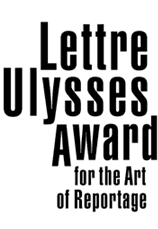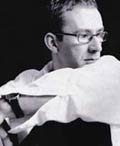
Pedro Rosa Mendes, Portugal
 "With each millimetre of soil I am confronted with the last moment of my life. As far as the eye can see. Thatís why they only drive me around at night. To protect me. Itís supposed to suit me. Now it is night, and abundantly so. I only move around at night. My fear has gone, deserted me. It has become part of the terrain. There is no solidarity. Nothing. Nothing for me to embrace. That can be deadly. The earth, the streets, the savannah, the land: fear is like a map that we are forced to cling to.Ē
"With each millimetre of soil I am confronted with the last moment of my life. As far as the eye can see. Thatís why they only drive me around at night. To protect me. Itís supposed to suit me. Now it is night, and abundantly so. I only move around at night. My fear has gone, deserted me. It has become part of the terrain. There is no solidarity. Nothing. Nothing for me to embrace. That can be deadly. The earth, the streets, the savannah, the land: fear is like a map that we are forced to cling to.Ē
Journalist, writer, novelist. Pedro Rosa Mendes was born in 1968 in Cernache do Bonjardim, Portugal. After studying jurisprudence at the University of Coimbra, he began to work as a journalist for the leading daily Público, mainly reporting on cultural events and foreign affairs. He has reported from many countries, including Zaire (now the Democratic Republic of Congo), Rwanda, Sierra Leone, Western Sahara, Zimbabwe, Angola, Afghanistan and Yugoslavia. Rosa Mendes was twice awarded the Feature of the Year Prize in Portugal for reportage, and in 2000 he was honoured with the Lisbon Press Club's Bordalo, the most prestigious award for Portuguese journalists.
In 1999 Rosa Mendes completed his first book Baía dos Tigres, which describes a three and a half month journey from Angola to Mozambique, and depicts the destruction and degradation created by the civil wars, particularly in Angola. It is a landscape where more mines can be found than human beings and where the political relations of the parties in conflict are driven by rage. Shortly after its publication in Portuguese, the book won the award for best novel by the Portuguese PEN Club, and was subsequently translated into thirteen languages. In 2001, Baía dos Tigres was among the five finalists for the prestigious Prix Astrolabe Étonnant Voyageurs in Saint Malo.
Rosa Mendes has collaborated with several artists on a range of projects. He contributed five short stories to O Melhor Café, a photography book by the distinguished Portuguese photographer Alfredo Cunha (1996). In November 2002, he co-authored a book together with French illustrator Alain Corbel on civil society organizations in Angola, Mozambique, Guinea-Bissau, São Tomé e Príncipe, and Cape Verde, entitled Ilhas de Fogo. The following year, in 2003, Rosa Mendes published the novel Atlântico, with pictures by the prominent photographer João Francisco Vilhena. He recently published a collection of his writings about East Timor entitled Madre Cacau, which, like Ilhas de Fogo, is illustrated by Alain Corbel.
Pedro Rosa Mendes now works as a freelance journalist, while also writing fiction - a new novel Lenin Oil, is to be released in Portugal this year and he is co-authoring a play for the Teatro Nacional Maria Matos in Lisbon. Over the course of the last four years, he travelled extensively throughout the Western African countries of Sierra Leone, Liberia, Guinea-Bissau and Ivory Coast in preparation for his new book, Schwarz.Licht, with German photo-reporter Wolf Böwig. The book is the first part of Waystation, a project he and Böwig are continuing to work on together, which documents the major changes in West and Central Africa. Rosa Mendes has contributed essays to a number of other photojournalism and photography projects, including Borders (Pro-Helvetia Foundation, 2001) and One Step Beyond (by German photographer Lukas Einsele, 2005). He was also among the contributors to a collection of essays about the psychosocial effects of work in settings where war and violence are everyday occurrences, compiled by Medico International two years ago.
Rosa Mendes contributes articles and essays to a variety of publications including Lettre International, Berlin, El País Semanal, Madrid, Terra Negra, Brussels, and Grand Street, New York. Some of his works have been translated into English, German, Spanish and French. Besides his native language, Rosa Mendes also speaks fluent French, English and Spanish.
Pedro Rosa Mendes has two daughters and currently lives in Lisbon.
